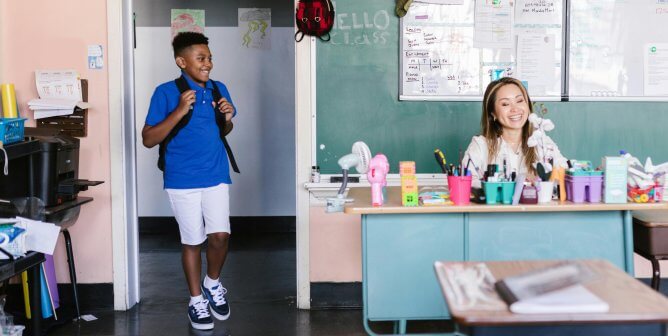Meet the Winners of TeachKind’s 2023 Teacher of the Year Contest
May is National Teacher Appreciation Month, and once again TeachKind hosted its annual contest in search of its 2023 Teacher of the Year. We heard from teachers from all across the country who are taking the phrase “feed two birds with one scone” to the next level, equipping their students with the academic skills and the empathy for all sentient beings that they need to be successful and compassionate citizens of the world. We’re pleased to recognize four outstanding humane educators who are creating a kinder future—and to celebrate the creative ways they’re doing so, both in and out of the classroom.
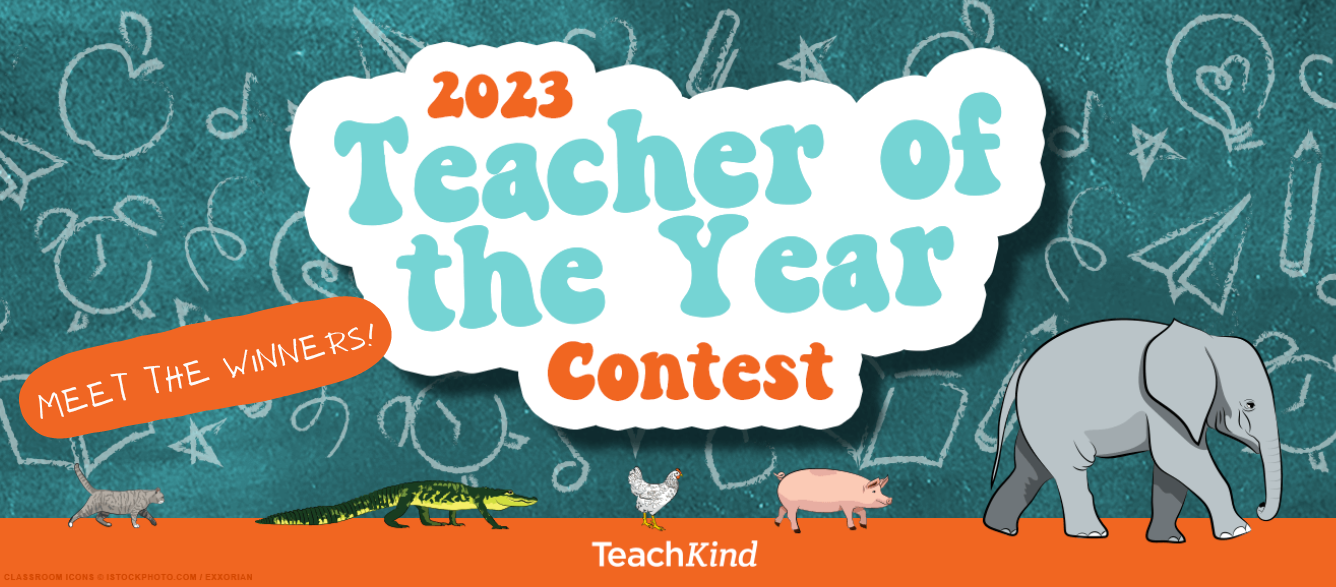
Thank you to everyone who entered or nominated someone for this year’s contest. With so many inspiring entries, narrowing them down was difficult, but we know that these educators will impress you as much as they did us. Meet our remarkable Teacher of the Year and runners-up:
TeachKind’s 2023 Teacher of the Year
Jessica Hagerman (Meridian World School, Round Rock, Texas)
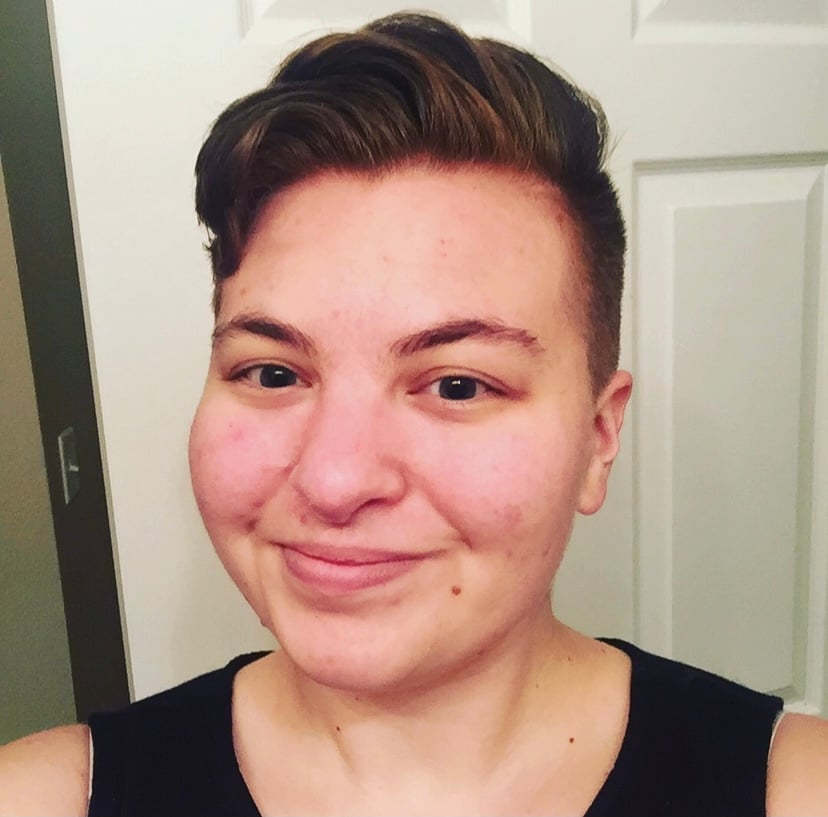
Jessica is a 7th grade science teacher at Meridian World School, an International Baccalaureate (IB) public charter school. She takes advantage of every opportunity in her course and the IB curriculum, which includes “ethical components of science,” to get her students thinking critically about animal ethics issues.
When they study human anatomy and physiology, Jessica helps her students conclude that examining a frog’s heart as a model for the human heart doesn’t make sense because of significant differences, such as the number of chambers. Although 7th grade science students at her school previously performed animal dissections, this misguided and archaic practice ended there after she joined the team. Dissection isn’t included in the Texas science standards, nor is it a required component in the curriculum map of Jessica’s district. In fact, the IB curriculum doesn’t even mention (let alone require) animal dissection, and no major medical school in the U.S. requires students to cut up dead animals. As the only 7th grade science teacher at her school, Jessica takes the time to explain to her students why animal dissection is ineffective, harmful, cruel, and unnecessary. To support her work, we’re including a free SynFrog in her prize package and we’ll be sending her a class set in the fall for the new school year. These hyper-realistic, completely dissectible models can be used to replace frog cadavers in classrooms and help students learn about organs, organ systems, and comparative anatomy without harming animals. With no toxic chemicals or ethical concerns, teachers and students leap at the opportunity to use this cutting-edge technology.
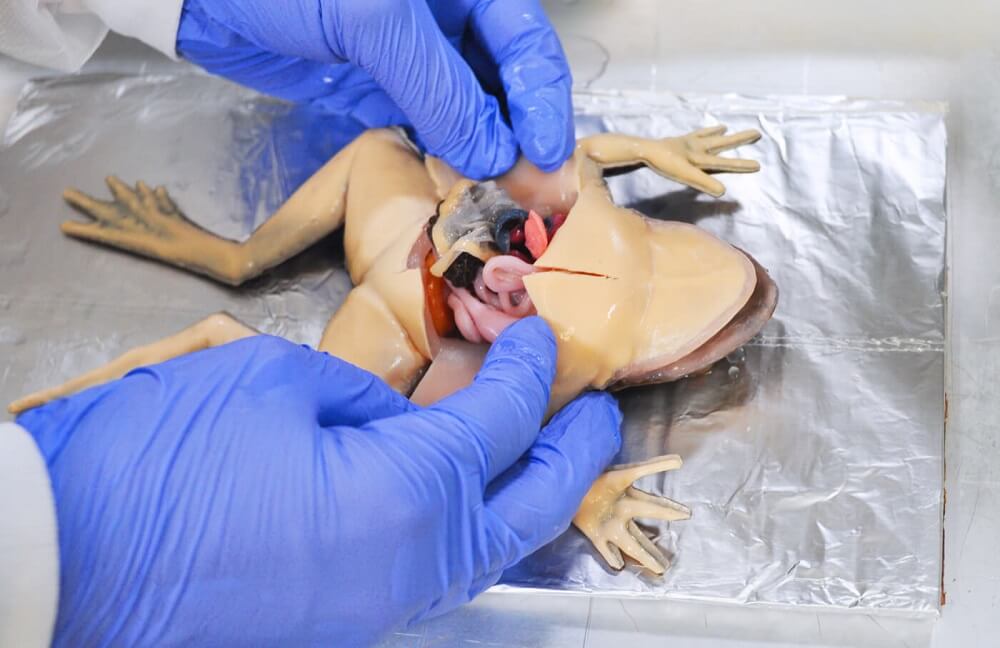
Learn how your school’s science department may be able to score free non-animal teaching tools, too!
When she’s not helping to save frogs and other animals by not subjecting them to dissection, Jessica incorporates animal ethics into other areas of her curriculum. For example, when studying the principles of genetics, she leads a class discussion about the traits of wild pigeons—who have excellent memories and remain devoted to their mates for life—that have helped them adapt to urban living and how these adaptations have resulted in their being labeled an invasive species or a nuisance population. She facilitates these discussions to help students understand why this is a human-created problem and to foster their empathy for other sentient beings. She also teaches a lesson about the selective breeding of animals for humans’ benefit, such as genetically manipulating cows and chickens to artificially increase their muscle mass, which results in severe health issues for the animals, and breeding breathing-impaired dog breeds, including pugs and French bulldogs, to look a certain way, even though this makes them struggle to breathe.
Jessica has been vegan for six years, and she’s open with her students about the many reasons she says no to meat, eggs, and dairy. She shares matter-of-fact information about vegan living but notes, “Information only gets you so far—we need to tie it in to the real world. Helping students make emotional and ethical ties is a way to start them on a path to develop their own views.” That’s why she puts her words into action, caring for a rescued gecko and a cat and talking to her students about the reasons why a classroom isn’t a suitable home for a “pet.” Instead, she has several class plants!
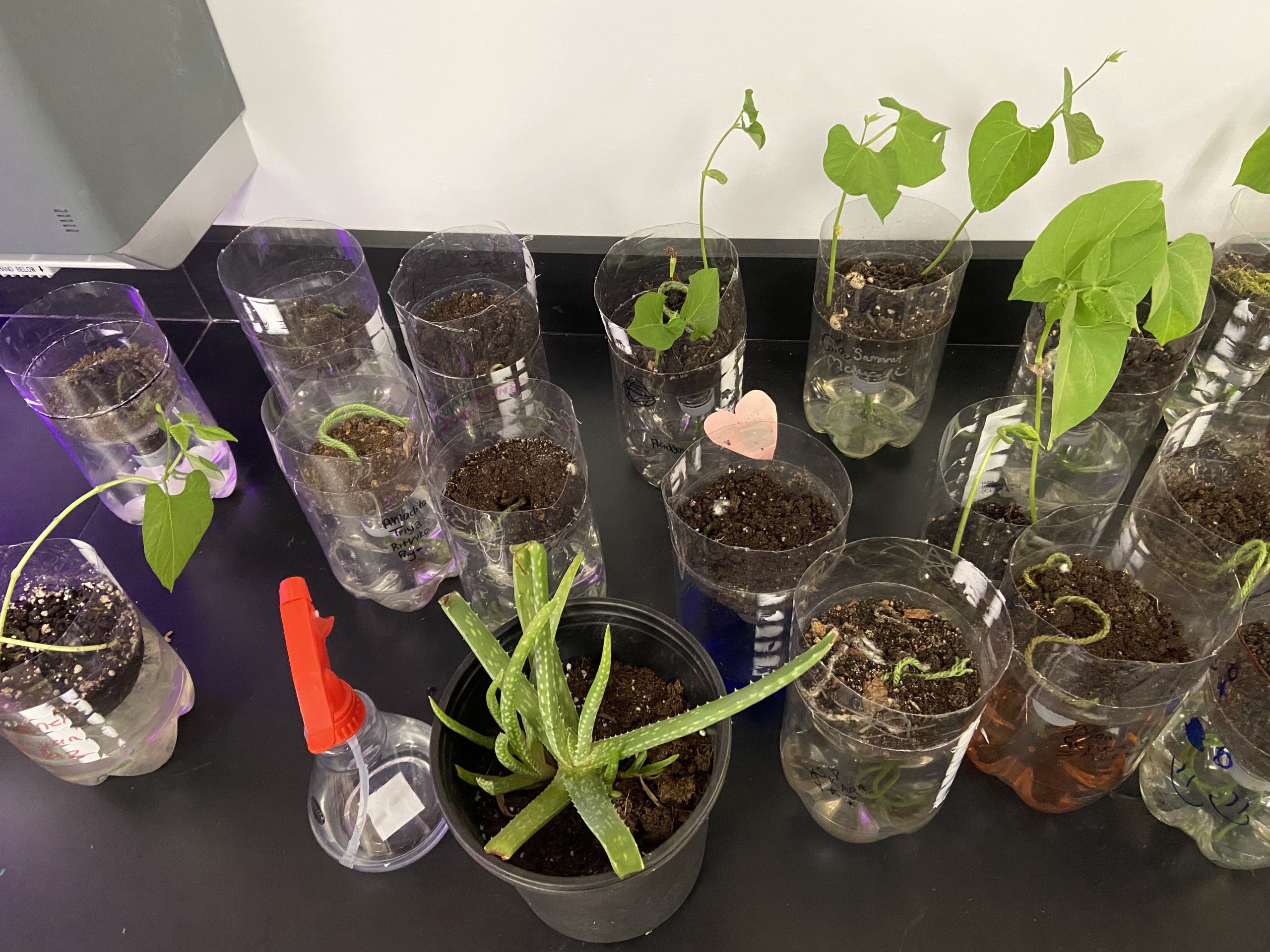
Jessica has been teaching for three years, but this school year has been her first year as a full-time teacher in her own classroom. Our hats go off to her—as former classroom teachers, the TeachKind team knows firsthand just how tough a teacher’s first year can be, so the fact that she has taken a stand against animal dissection and “classroom pets,” all while seamlessly integrating animal rights into her science curriculum, deserves a round of applause.
Congratulations, Jessica, and thank you for all that you do for animals!
TeachKind 2023 Teacher of the Year Runners-Up
Malorie Cook (Woodway Center, Edmonds, Washington)
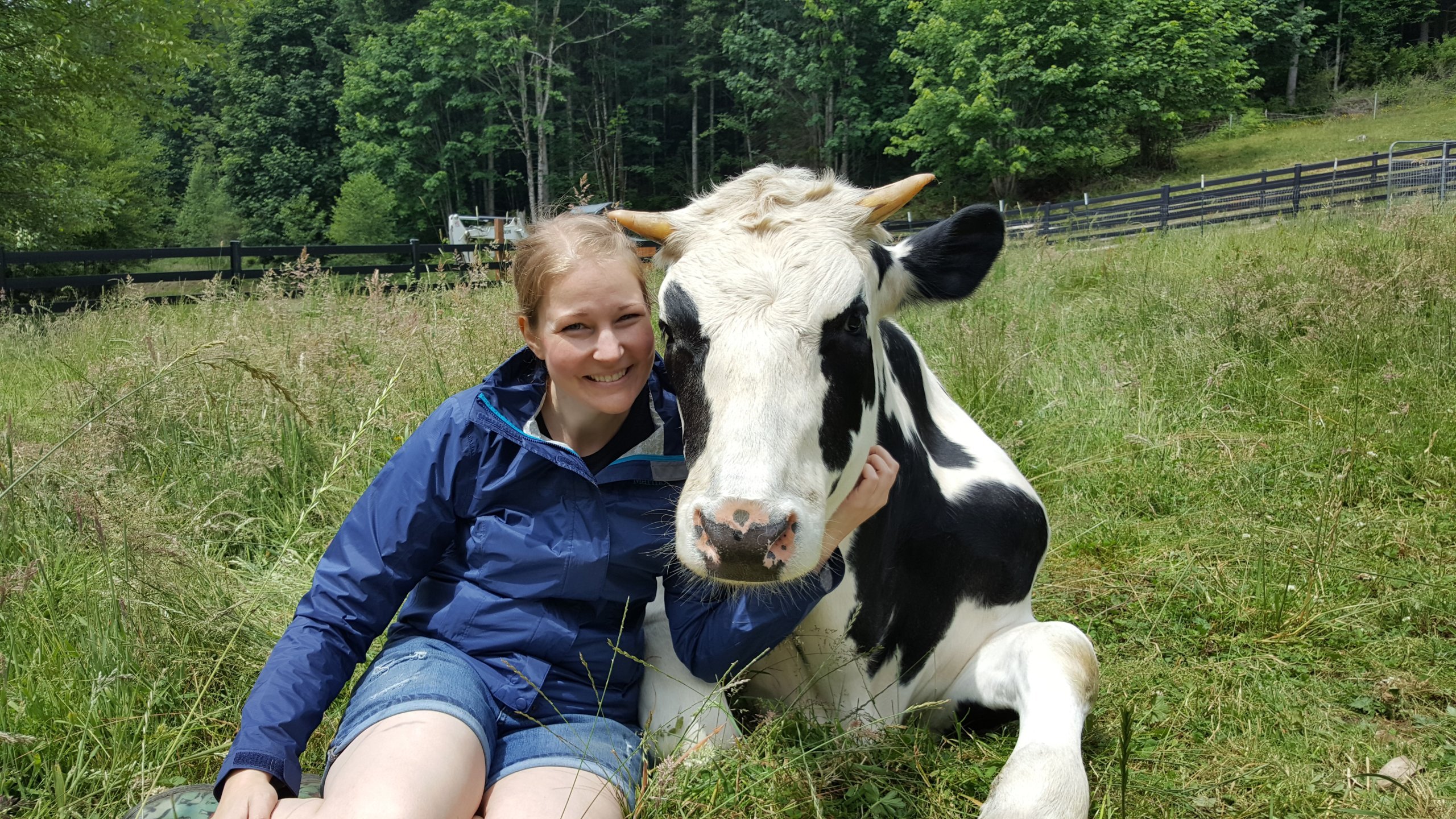
Malorie is a kindergarten teacher who understands the value of developing children’s empathy early. She has been teaching for 10 years, the last two of which have been at Woodway Center, a school for students in pre-K and kindergarten. Malorie’s fellow educators are interested in and inspired by her lessons on kindness to animals, a testament to her highly engaging teaching methods.
It doesn’t matter how commonplace or unfamiliar an animal may be—Malorie teaches compassion for all, big and small! Her unit about bats and spiders is a hit with students, parents, and her colleagues. She explains to students that spiders have families and that it’s our job to leave them alone or carefully relocate them outside. She’s so passionate about insect rescue that she’s known as the “spider relocater” at her school. Malorie has successfully helped children learn to respect, not fear, animals—and a parent of one of her students even shared that after learning more about bats through her, they no longer fear these interesting individuals.
Passionate about the connection between all sentient beings and the natural world, Malorie educates her students about how caring about the plight of polar bears and their waning habitat is a form of climate action, which in turn helps other animals, including humans, around the world. She also teaches a unit on tropical rainforests and how deforestation negatively affects animals. She sees that talking about how to help animals inspires students so much that when it comes time to work on informational writing (which can be challenging and frustrating for many kindergarteners), they eagerly compose their texts.
Inspired by the diverse ecosystems of the Pacific Northwest, Malorie teaches about squirrels, birds, and other native wildlife to help kids develop a reverence for the animals they share the world with. She discusses the Southern Resident orcas, who call the nearby waterways home, and the food scarcity they’re experiencing and ties this into lessons about the local community. She spoke to her students about Lolita, the long-suffering orca at the Miami Seaquarium, who passed away in her concrete cell in August 2023 after spending more than five decades imprisoned there.
When she’s not teaching, Malorie is a lead volunteer at Pasado’s Safe Haven, an award-winning animal sanctuary. She trains other volunteers and cares for rescued goats, cows, and sheep. She has also volunteered with the sanctuary’s summer camp program, which serves students in grades 1–6. Malorie says, “These animals are my friends, and it would be a disservice to not share their stories of where they were rescued from.”
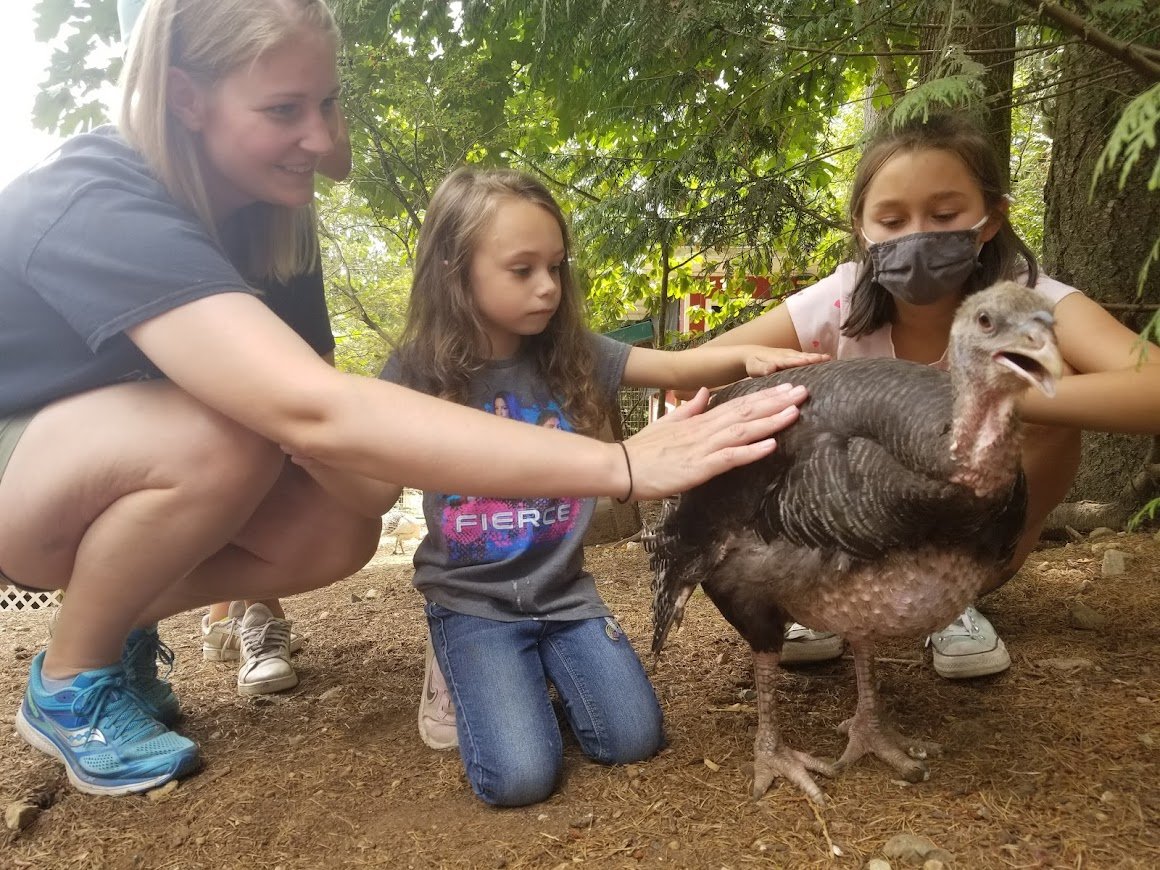
In addition to virtual field trips to Pasado’s, Malorie has organized an upcoming in-person trip to the sanctuary for 135 kindergarten students. Her school is in the suburbs, so this will be the first time many of them connect with farmed animals. She displays photos of the sanctuary’s animals around her classroom and talks about how cows are her best friends. This aids her in conversations about her vegan lifestyle, and she responds thoughtfully to students’ questions in order to help them learn how kind consumption habits can help animals.
Thank you, Malorie, for speaking up for animals in and out of the classroom!
John Grilli (San Fernando Senior High School, Los Angeles, California)
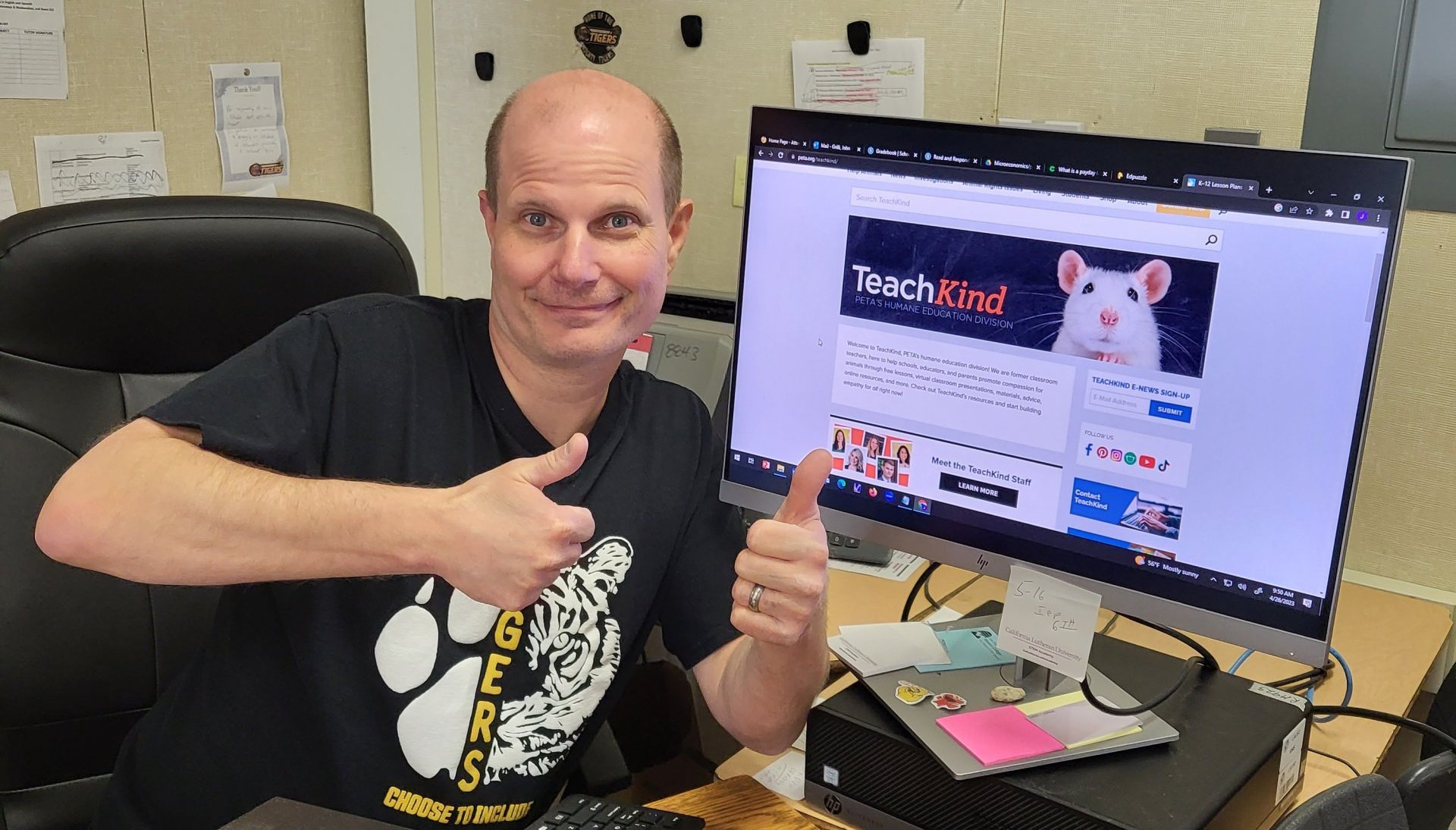
John is a 12th grade political science and economics teacher and a cultural historian who first became interested in animal rights in the 90s through his high school environmental club. He realized that the issues he cared deeply about were all connected—many of the ways humans are harming the environment also harm animals and ourselves—so he was inspired to leave animals off his plate for good and eventually become the influential humane educator he is today.
There’s more than one way to peel a potato when it comes to teaching compassion for animals in the classroom, and John is an expert at it. He thoughtfully guides students to understand how humans have exploited other animals for power and profit throughout history. He does this through videos of how monkeys are abused for coconut products, class discussions of the frequent misuse of the phrase “man’s dominion over the Earth” as a justification to treat other animals as commodities, and group projects centered on political action. He encourages his students to speak up for animals during their required community service hours. One group of students learned about all the ways rats are exploited and—on their own—petitioned another teacher at the school to take her classroom rats home. John allowed his students to take complete ownership over this campaign and was there to provide guidance and support when needed.
John inspires his students to help animals outside school as well. Some volunteer to clean up local beaches for the benefit of the animals who call it home, the environment, and the rest of the community—and others spend their free time caring for homeless cats and dogs at their local animal shelter. John even displays TeachKind’s empathy-building posters in his classroom, quietly but effectively reminding students to choose animal-friendly language and recognize the connection between animal rights and other social justice issues.
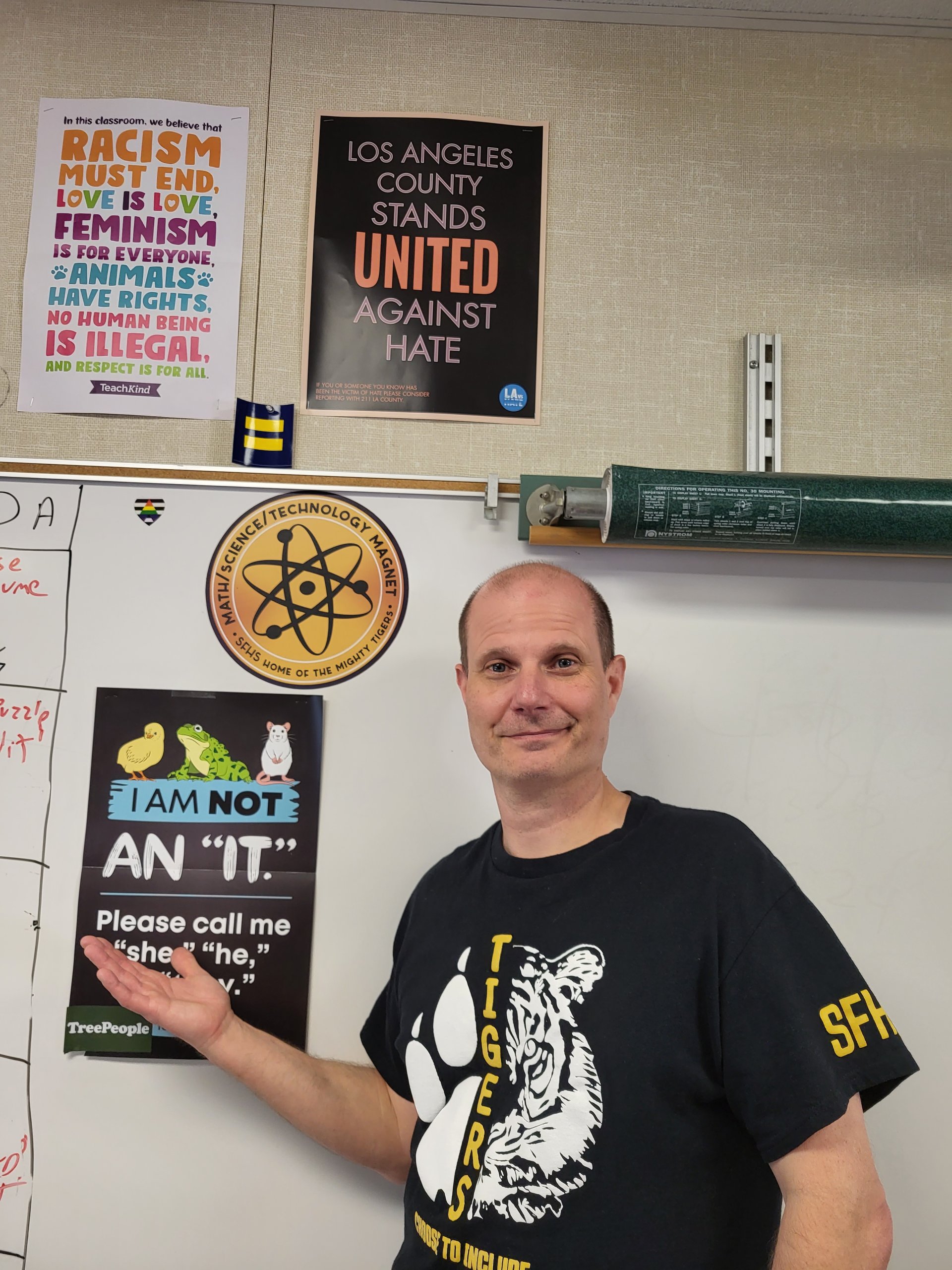
Thank you for your commitment to and creativity in teaching your students to have compassion for animals, John!
Caroline Kelley (Peaceful Child Education, Miami, Florida)
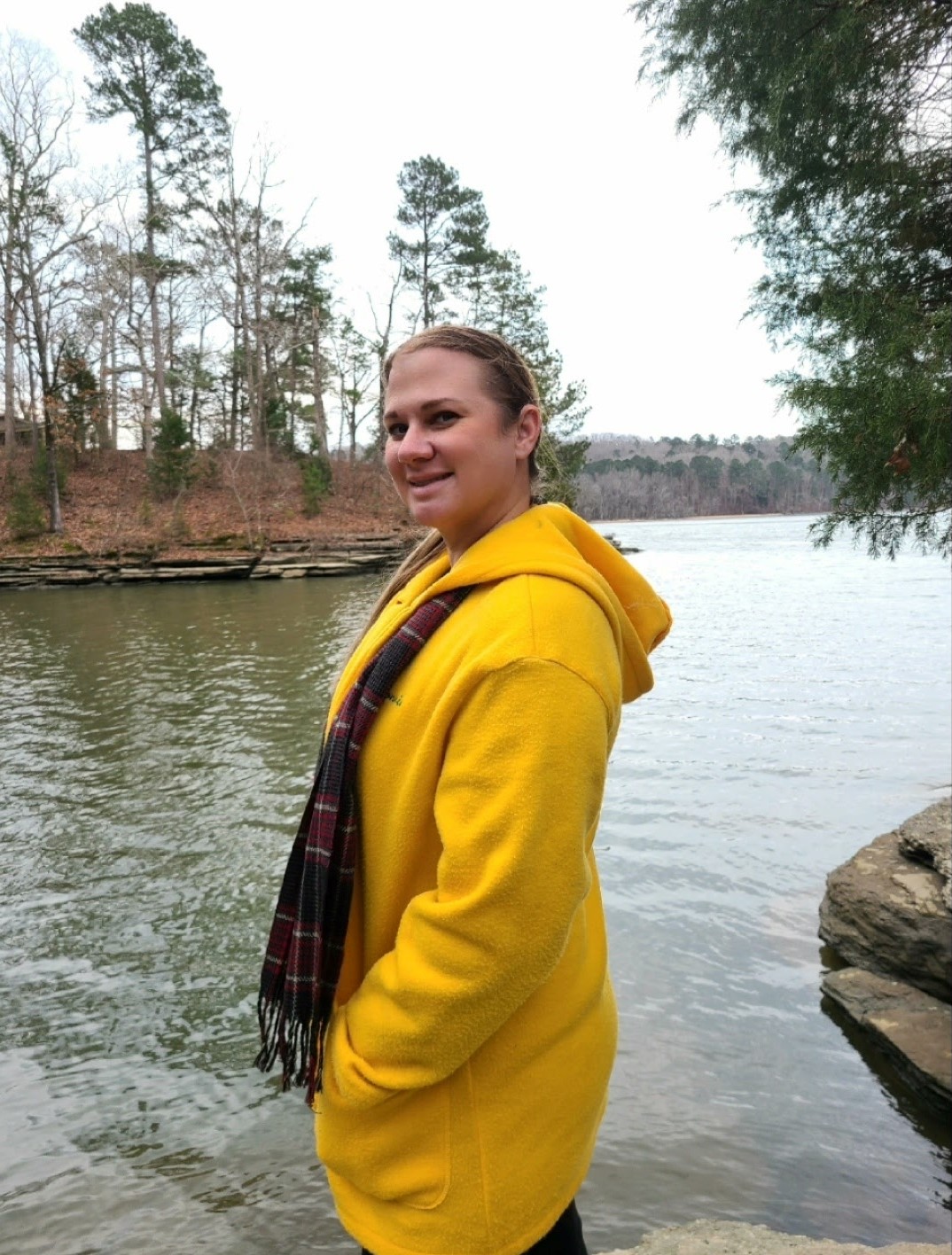
Caroline is a cofounder of Peaceful Child Education, Florida’s first early childhood humane education program focusing on education and training. She is also an administrator and teacher in the program. Her journey into humane education began during the pandemic, when she and her team began incorporating meditation and deep breathing into their teachings in order to help students with transitions and noticed that this also decreased challenging behavior. Inspired by Zoe Weil’s The World Becomes What We Teach: Educating a Generation of Solutionaries, Caroline determined that addressing the gap in social and emotional learning (SEL) is essential to making positive change, which led her to enroll in coursework at the Institute for Humane Education, where she is currently finishing her master’s in humane education.
Using her ingenuity and passion for SEL, Caroline motivates even the youngest learners to consider those around them, including other animals, through fun and engaging hands-on activities—such as an obstacle course that the children complete dressed as their own unique superheroes with the aim of rescuing a dog in need at the finish line. When studying pollinators, students observe bees, butterflies, and other insects by using livestreams, video footage, and their school garden. In discussions about where milk comes from, Caroline lists all the wonderful vegan options, and she has brought in vegan milks for students to taste.
Caroline also leads a camp focused on South Florida sea turtles, animals who are near and dear to her and her son’s hearts. Campers learn about the importance of looking out for sea turtles through participating in beach cleanups and trips to a local turtle hospital. They were even able to observe the release of a rehabilitated sea turtle back into the ocean. Parents shared that since participating in the camp, their children have been regularly reminding them to clean up litter and help keep animals safe by disposing of any waste they bring to the beach.
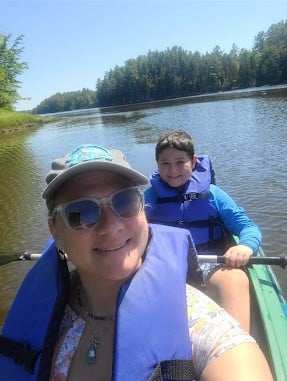
During Caroline’s upcoming summer program, “Explore the World,” students will learn about different animals and their unique habitats around the globe and will have the opportunity to try different vegan dishes as they explore new cultures. She is currently working to create a scholarship fund with the goal of allowing five low-income students to attend the program free of charge.
It’s no wonder Caroline has been invited to be a guest speaker at the upcoming 2023 Humane Education Conference of the Association of Professional Humane Educators, where she’ll present “Nurturing a Seedling: Teaching Humane Education in Early Childhood.” She wisely points out, “Early childhood–age children are influenced by their environment, and we strive to create an environment of respect, peace, and love toward all.”
Thank you for spreading the word that animals are not ours to use, Caroline!
*****
Congratulations to these kind and innovative teachers, and thank you again to everyone who entered the contest or nominated someone! Are you ready to up your game for next year’s contest and put yourself in the running to be the 2024 TeachKind Teacher of the Year? We’re here to support you! Sign up to receive TeachKind’s newsletter for year-round inspiration, resources, and guidance for incorporating kindness to animals into your curriculum—and don’t forget to follow TeachKind on TikTok, Instagram, and TPT.
By submitting this form, you’re acknowledging that you have read and agree to our privacy policy and agree to receive e-mails from us.




